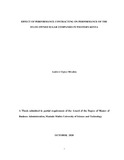EFFECT OF PERFORMANCE CONTRACTING ON PERFORMANCE OF THE STATE OWNED SUGAR COMPANIES IN WESTERNKENYA
Abstract
oor performance in the Kenya public sector consistently hindered the realization of sustainable economic growth and development since the country attained her independence in 1963. Among the noted factors that contributed to poor performance included: excessive regulations and control, frequent political interference, poor management, outright mismanagement of resources and poor guiding vision, unclear focus as to what is expected from employees and poor or no methods of measuring performance has been the greatest challenge. The Government elected in 2003 decided to manage public service through performance contracting system to address the situation. The main objective of this study was to determine the effect of PC on performance of state owned sugar companies in Western Kenya. Specifically, the objectives ought to establish the effect of setting of performance objectives on organizational performance in the state owned sugar companies, to establish the effect of performance implementation on organizational performance in the state owned sugar companies and to establish the effect of performance contract review on organizational performance in the state owned sugar companies. The study adopted a cross-sectional descriptive research design in which qualitative and quantitative data were collected. The target population was 999 managers and supervisors of the state owned sugar companies in Western Kenya. A sample of 286 was identifiedfor the study through stratified sampling from the managers who sign performance contracts. Questionnaires were utilized to collect primary data from respondents. Secondary data was gathered from firm’s strategic plans and websites. Frequencies, percentages, mean scores were used to analyze the data with the help of SPSS, correlation was used to establish the relationship between variables and multiple regressions was used for prediction. A pilot study was done using Chemelil sugar company .A reliability coefficient of (ἁ=0.833) was obtained and accepted since it was above (ἁ>0.7) an acceptable value. Validity of research instruments was tested using content validity. Pearson’s correlation analysis revealed that there was positive significant correlation between Performance contract objectives and targets and organization performance (r=0.445,p< 0.000).Similarly there was positive significant correlation between Performance contract implementation and organization performance (r=0.623,p<0.000) and lastly a positive significant correlation between Performance contract review and organization performance (r=0.535,p<0.000). Summary of the model indicated there was a very positive relationship (R=0.64) between the dependent variable and the independent variables. Regression Coefficients of the findings showed that a unit increase in the performance contract objective and target would lead to a (0.16) unit improvement in the organizational performance unit increase in the Performance contract implementation would lead to a (0.44) unit improvement in the organization performance, unit increase in the Performance contract review would lead to a (0.21) unit improvement in the organizational performance. It was concluded that setting of the performance objectives, performance implementation and performance review had positive and significant effect on the performance of state owned sugar companies. The study recommends that the signing of performance contracts should be made mandatory for every employee in the public sugar firms. There is need for policy framework and regulatory mechanisms to be put in place to reward or punish performance based on commitment of employees, resource allocation, solid performance measures and outcomes.

